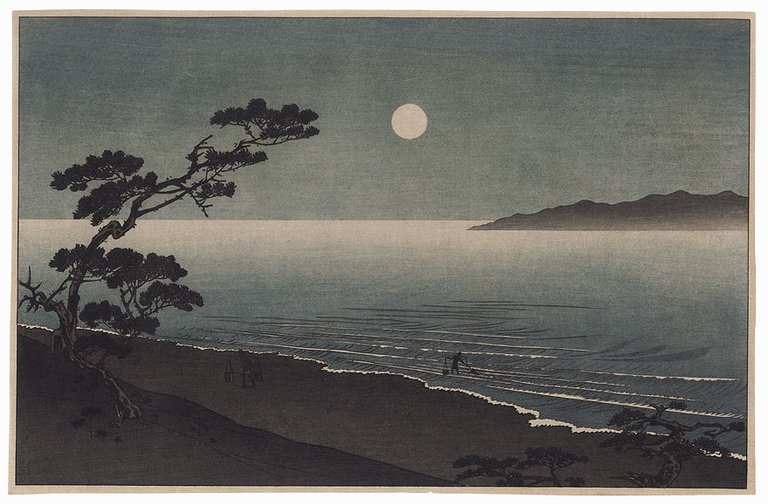At Suma: A Place of Beauty and Loneliness ~ Haiku of Japan
Approximately seven decades ago, esteemed poet Takahama Kyoshi, found himself immersed in contemplative thought about his teacher and mentor, Masaoka Shiki. This reflective state of mind led to the creation of a poignant haiku.
tsuki wo omoi hito wo omoite suma ni aru
thinking of the people
at Suma
—Kyoshi


In his headnote for this haiku, Kyoshi said this was written for the 50th anniversary of Shiki's death. Shiki died in 1902. Some time ago I shared with you Kyoshi's haiku about the death of Shiki, which he was present for. Now, fifty years later, he was thinking again of his teacher.
Kyoshi is referring to and responding to a haiku by Shiki:
kotozute yo Suma no ura wa ni hirune su to
on the shores of Suma
I will take a nap
Suma is a fairly famous location in Japanese history. It was the location of the Battle of Ichi-no-Tani in 1184, an important battle in the Genpei War fought between the Taira and the Minamoto clans, an incredibly famous battle in Japanese history. It was at Ichi-no-Tani where the most famous duel in Japanese history took place between Atsumori and Kumagai. This place was where the Taira were routed, marking the start of their downfall. Many Noh plays were set in this location, featuring the ghosts of the defeated Taira warriors.
It is a place of incredible beauty, but that beauty takes on a sad tone because of the history mentioned above. It was also a place of exile. Genji of The Tale of Genji was banished to Suma for a time. This adds a lonely feeling to the location. In addition, Suma is located on the "back" of Japan, giving it, in Japanese literature scholar Haruo Shirane's words, "a monochromatic, mist-filled, white-ish, moonlit, lonely atmosphere".
These mixed together to make it symbolic of exile, solitude, and transient beauty. Poets of the Heian era often referred to Suma. Haiku poets also often referred to it.
All that background in mind, we might see why Shiki wrote of the place. Shiki was suffering from TB, which he fully expected to kill him. In fact he would die only seven years after writing the haiku above and already he was having problems getting around because of the disease. And this also may be why Kyoshi was thinking of this haiku from Shiki on the anniversary of his death.
The kigo in Kyoshi's haiku is moon, a kigo for autumn. The use of the moon here subtly amplifies the sense of solitude and transient beauty associated with Suma. The moon, especially in autumn, has long been a symbol of melancholy and loneliness in Japanese poetry, its serene luminescence illuminating the impermanence of life. As we have seen many many times, highlighting the transience of this life is a constant theme in Japanese poetry generally and haiku specifically.
In the context of Suma, with its history of exile and tales of fallen warriors, the moon serves as a poignant reminder of past events and lost connections. The juxtaposition of the moon and Suma, both imbued with feelings of solitude, paints a scene that is quietly reflective and deeply contemplative, inviting readers to ponder the interplay of nature, history, and human emotion.

What do you think, dear reader? Can you picture the setting here? The feeling is a common one not only in Japanese poetry but in all of Japanese literature and even Japanese movies. Can you think of a similar place in the European or American literary tradition that holds the same feeling?
❦
 |
David LaSpina is an American photographer and translator lost in Japan, trying to capture the beauty of this country one photo at a time and searching for the perfect haiku. |
That is, me! If you like this translation, feel free to use it. Just credit me. Also link here if you can. ↩
Ah man, I miss Genji. It was a good steakhouse. It's too bad the building had to burn down. Now there is just and empty lot around the corner where it used to be. On your birthday they would give you a discount on your meal of whatever your age was. 😃
You took us back memory lane and sadly for me, I can't picture the setting here.I guess I still have a lot to learn when it comes to literature.